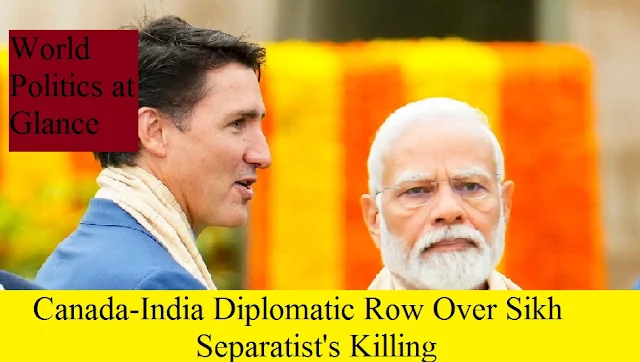 |
| Image Credit: Google |
Adil Javed
Following the assassination of Sikh separatist leader Hardeep Singh Nijjar earlier this year, a diplomatic issue between Canada and India has reached a boiling point.
This
article digs into the rising tensions, trade interruptions, and history of the
Khalistan movement to give light on the complexities of this worldwide schism.
Canada-India Diplomatic Rift Deepens: Expulsions and Trade Talks Stall
A top Canadian diplomat has been told to leave India within five days in retaliation for Ottawa's expulsion of an Indian diplomat.
This retaliation indicates the two
countries' deepening unease. Trade talks have stalled, and Canada just canceled
a trade trip to India, adding to the diplomatic tensions.
Allegations of Indian Government Involvement in Nijjar's Murder
The assassination of Hardeep Singh Nijjar, a significant player in the Khalistan movement, is at the center of the conflict.
Canada is currently investigating serious allegations that Indian government operatives were involved in Nijjar's assassination outside a cultural center in Surrey, British Columbia.
At the
time of his death, Nijjar was apparently arranging an unofficial referendum in
India for an independent Sikh republic.
India's Response: Denial and Accusations
India quickly slammed Canada's charges as "absurd and motivated" and demanded legal action against anti-Indian groups operating on Canadian soil.
Despite its
decline in recent years within India, the Sikh separatist movement, also known
as the Khalistan movement, is regarded as a national security danger by Indian
officials.
The Khalistan Movement: A Historical Perspective
To grasp the depth of the situation, one must first learn about the Khalistan movement's past.
The movement began in the 1980s as an armed revolt trying to establish an independent Sikh state in Punjab, India.
While the movement has largely died
out within India, it continues to gain traction among the Sikh diaspora in
places like Canada and the United Kingdom.
Canada's Sikh Population and Political Implications
Canada has a sizable Sikh population, accounting for around 2% of the overall population.
The political ramifications of the disagreement go beyond diplomacy, with Canadian opposition leader Jagmeet Singh expressing concerns about damaging India's human rights record and influencing travel visas.
At the end, the diplomatic impasse between Canada and India over the death of Hardeep Singh Nijjar exemplifies the Khalistan movement's lasting complexity and its impact on bilateral relations.
The international world is keeping a close eye on both
countries as they try to work out their disagreements.
Also Read:
Canada-India Relations and the Khalistan Movement: A Comprehensive Overview












0 Comments